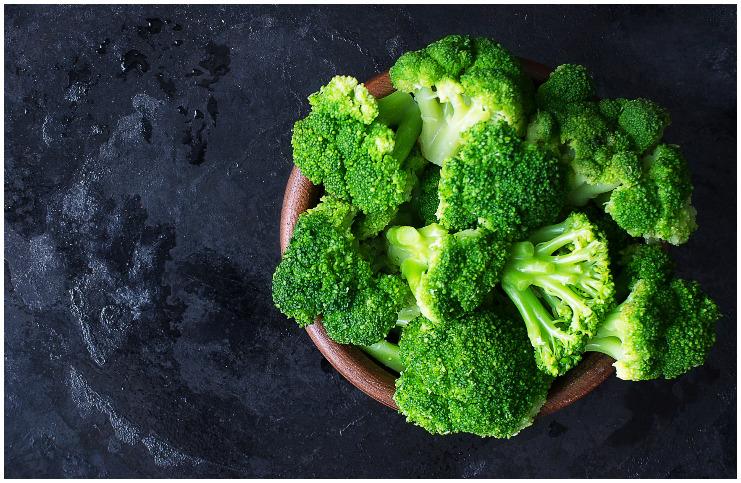Asparagus
It is a vegetable from the Asparagaceae family and is thought to have originated 2,000 years ago in Northern Africa and the eastern Mediterranean region.
In the present day, the top country producers include – China, Peru, Mexico, Germany, and Thailand.
Nutrition Facts
This vegetable is a good source of dietary fiber, folate, vitamin A, thiamin, vitamin C, riboflavin, vitamin E, pantothenic acid, vitamin K, magnesium, chromium, manganese, iron, selenium, potassium, zinc, calcium, and phosphorus.
Health Benefits
UV Rays Protection
It is a good source of glutathione, a potent antioxidant that can help destroy carcinogens and protect the skin from pollution, sun damage, and the effects of aging.
Moreover, according to recent research, a glutathione deficiency is strongly associated with neurological disease.
Fights Obesity
Not only is this vegetable low in calories (one cup has about 32 calories) and fat, but it also contains high amounts of insoluble and soluble fiber, making it an excellent choice if you are trying to lose weight.
Also, a regular intake of this vegetable provides a healthy bowel movement and prevents constipation.
Bone Health
One serving contains about 70 percent of the daily recommended intake of vitamin K. This is great news for your bones since vitamin K is needed for keeping the bones healthy and strong.
Vitamin K may also help people maintain low blood pressure by preventing a few minerals from accumulating in the arteries, leading to arteriosclerosis.
Good For Diabetics
Type 2 diabetes mellitus is the most common form of diabetes and approximately 29.1 million Americans have it. More importantly, it is thought that about 8.1 million may be unaware of their condition.
This popular vegetable can prevent type 2 diabetes by helping glycemia levels stay under control while boosting the output of insulin, according to a study issued in The British Journal of Nutrition.
Side Effects
Some people can experience allergic reactions and symptoms which include – headaches, dizziness, nausea, breathing difficulties, redness and itching of the skin, dry cough, irritating throat, runny nose, or swelling of the eyes.
These allergic reactions may occur in individuals who are sensitive to other vegetables from the Liliaceae family, which includes leeks, onions, chives, and garlic.
Moreover, about half an hour after a meal containing this vegetable, some people have a pungent odor in their urine.
Broccoli
It is considered one of the most nutritious dark green leafy vegetables that can offer numerous benefits for human health.
Its color ranges from dark green to deep sage to purplish green. Also, varieties have different taste, ranging from fibrous to soft and crunchy.
Nutrition Facts
It contains a remarkable amount of nutrients including vitamin A, manganese, vitamin C, vitamin K, folate, protein, dietary fiber, calcium, thiamin, selenium, niacin, potassium, pantothenic acid, magnesium, zinc, and calcium. It is also “very low” on the glycemic index, which makes it a great addition to the regular nutrition of type 2 diabetics.
Health Benefits
Supports the Nervous System
One of the most important health benefits of eating this vegetable is a healthy nervous system since it has high amounts of potassium. More importantly, along with phosphorous, calcium, manganese, and other essential minerals, potassium helps to keep the bones healthy and strong.
A potassium deficiency may lead to poor concentration, fatigue, mood changes, and trouble remembering and learning.
Antioxidant Properties
Due to its antioxidant content, this dark green leafy vegetable has been linked to the prevention of some types of cancer, like – breast, oral, neck, head, and liver.
Prevents Osteoporosis
Osteoporosis causes about 8.9 million fractures every year worldwide, which is approximately 1 osteoporotic fracture every 3 seconds. A regular diet that is high in vitamin K (like this cruciferous) is strongly associated with a lower risk of fractures since it may help slow bone loss.
Skin Health
It is rich in vitamin C, an essential nutrient that maintains healthy teeth and bones as well as helps heal wounds, according to a study conducted at the University of Maryland Medical Center.
Additionally, this vitamin supports the production of collagen (the main protein found in the human body), which is required in the production of ligaments, cartilage, blood vessels, tendons, and skin.
Prevents Cancer
The isothiocyanates chemicals found in this vegetable have cancer-fighting properties, as per a 1994 research at the Johns Hopkins University School of Medicine in Baltimore.
Also, sulforaphane inhibits the enzyme histone deacetylase, which is acknowledged to enable cancer cell progression.
Weight Loss
It is a good source of sulforaphane, a strong antioxidant that has a fat-burning effect by stimulating the breakdown of fat cells, according to Biochemical and Biophysical Research Communications.
Furthermore, sulforaphane can also prevent the formation of cancer as well as it supports current allopathic medical treatment options.
Side Effects
There are no scientifically proven side effects.
Asparagus vs Broccoli – Which Has A Better Nutritional Profile?
These vegetables have a similar nutritional profile, but the balance is a little inclined in the favor of broccoli due to its increased level of protein, dietary fiber, folate, vitamin C, iron, vitamin K, and potassium.
Featured image credit – Shutterstock
READ THIS NEXT: Cashews vs Peanuts
References https://www.businessinsider.com/study-links-asparagus-to-cancer-in-mice-asp https://www.ncbi.nlm.nih.gov/pubmed/25894575 https://www.ncbi.nlm.nih.gov/pmc/articles/PMC4391535/
